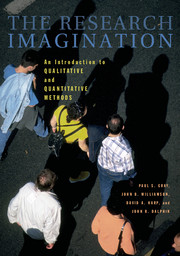Book contents
- Frontmatter
- Contents
- Preface
- 1 RESEARCH PROCESS
- 2 THEORY AND METHOD
- 3 RESEARCH DESIGN
- 4 MEASUREMENT
- 5 ETHICAL AND POLITICAL ISSUES
- 6 SAMPLING
- 7 SURVEY RESEARCH
- 8 INTENSIVE INTERVIEWING
- 9 OBSERVATIONAL FIELD RESEARCH
- 10 FEMINIST METHODS
- 11 HISTORICAL ANALYSIS
- 12 EXPERIMENTAL RESEARCH
- 13 CONTENT ANALYSIS
- 14 AGGREGATE DATA ANALYSIS
- 15 COMPARATIVE RESEARCH METHODS
- 16 EVALUATION RESEARCH
- 17 INDEXES AND SCALES
- 18 BASIC STATISTICAL ANALYSIS
- 19 MULTIVARIATE ANALYSIS AND STATISTICAL SIGNIFICANCE
- EPILOGUE: THE VALUE AND LIMITS OF SOCIAL SCIENCE KNOWLEDGE
- Appendix A A Precoded Questionnaire
- Appendix B Excerpt from a Codebook
- Author Index
- Subject Index
- References
5 - ETHICAL AND POLITICAL ISSUES
Published online by Cambridge University Press: 05 June 2012
- Frontmatter
- Contents
- Preface
- 1 RESEARCH PROCESS
- 2 THEORY AND METHOD
- 3 RESEARCH DESIGN
- 4 MEASUREMENT
- 5 ETHICAL AND POLITICAL ISSUES
- 6 SAMPLING
- 7 SURVEY RESEARCH
- 8 INTENSIVE INTERVIEWING
- 9 OBSERVATIONAL FIELD RESEARCH
- 10 FEMINIST METHODS
- 11 HISTORICAL ANALYSIS
- 12 EXPERIMENTAL RESEARCH
- 13 CONTENT ANALYSIS
- 14 AGGREGATE DATA ANALYSIS
- 15 COMPARATIVE RESEARCH METHODS
- 16 EVALUATION RESEARCH
- 17 INDEXES AND SCALES
- 18 BASIC STATISTICAL ANALYSIS
- 19 MULTIVARIATE ANALYSIS AND STATISTICAL SIGNIFICANCE
- EPILOGUE: THE VALUE AND LIMITS OF SOCIAL SCIENCE KNOWLEDGE
- Appendix A A Precoded Questionnaire
- Appendix B Excerpt from a Codebook
- Author Index
- Subject Index
- References
Summary
INTRODUCTION
The first four chapters of this book set the stage for learning about research by introducing you to a vocabulary that specifies the various parts of the process and presenting the basics of research design and measurement. These chapters are a foundation for investigating the social world. However, before the various methods are presented in detail, this chapter summarizes the ethical and political context for research.
Growing up, many of us have been taught to abide by the Golden Rule in church, school, and community. Social researchers, however virtuous they may be in a personal sense, are concerned about ethical behavior in a more specific context. Because of the public nature of science and the increasing visibility and accountability of researchers, they must pay attention to ethical principles or suffer the criticism of those who read their work and who provide them with data. As we will see in this chapter, in research, doing the “right thing” is not always easy or obvious!
Suppose that a team of politically moderate social scientists has received a research grant from the federal government to investigate political extremism on both the left and the right in America. The researchers will interview members of the Communist Party and the American Nazi Party to find out what their attitudes are on a variety of political and social issues.
- Type
- Chapter
- Information
- The Research ImaginationAn Introduction to Qualitative and Quantitative Methods, pp. 81 - 100Publisher: Cambridge University PressPrint publication year: 2007



